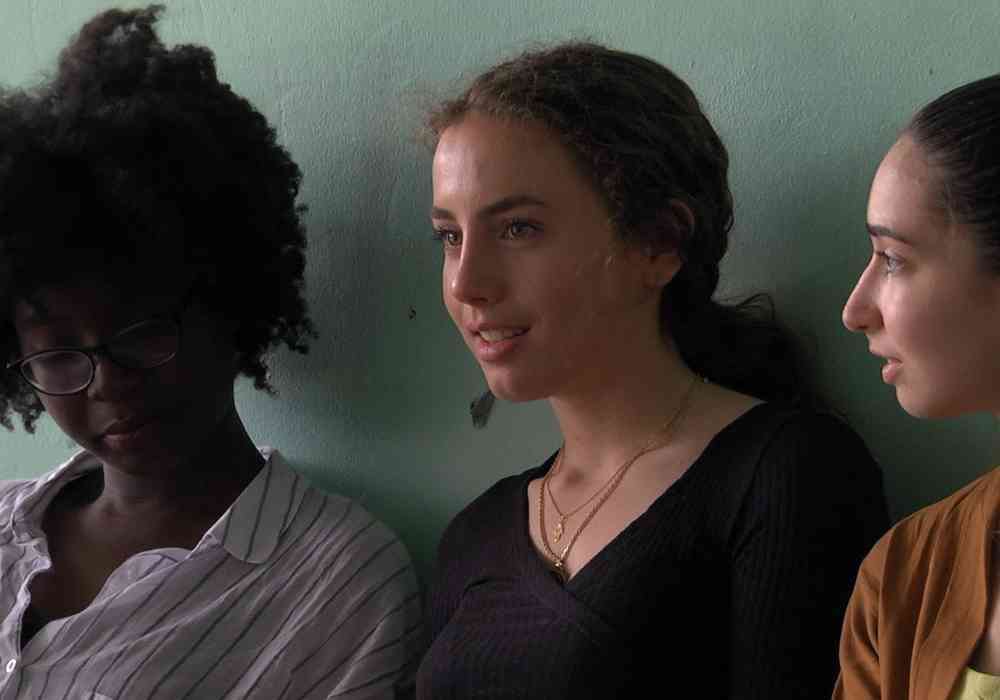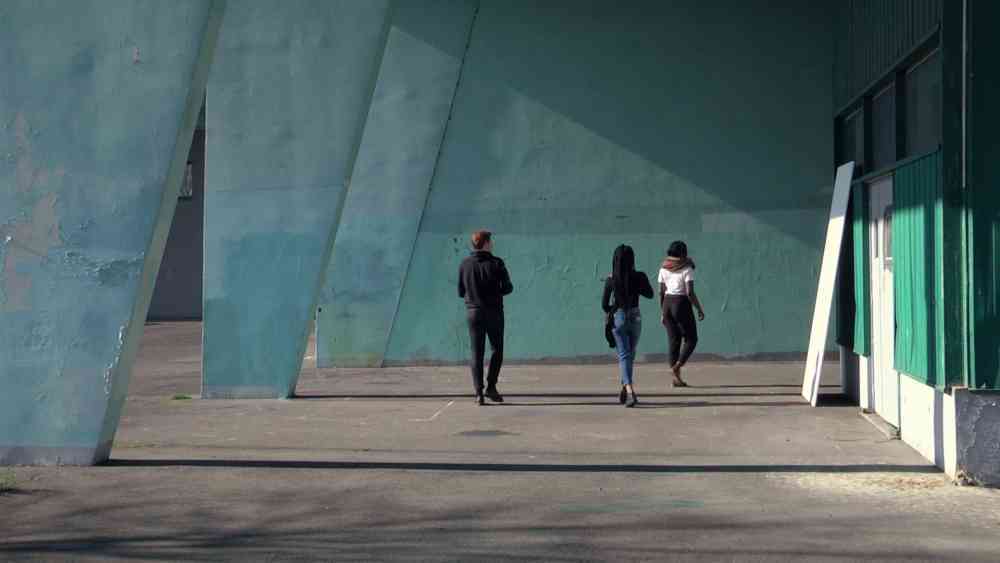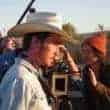Simon talks about making her new documentary, Premières Solitudes, tackling teenage frustrations, being truthful on camera, and the position of the adult filmmaker vis-a-vis her young subjects.

Claire Simon’s previous film, Le Concours, was an observational doc focused on the inner workings of the entry exam for La Femis, the famous Parisian film school which, to this day, continues to form a huge bulk of France’s cinematic talents. Although her latest film, Premières Solitudes, also focuses on film students, it strays far from the Wiseman-esque aesthetic of Le Concours. Instead, the documentary lets the feelings and emotions of its subjects take centre stage and crucially lets them speak for themselves, offering a much more humane portrait of teenagers as individuals.
Yet both films strike one as unflinchingly honest, almost brutally so. If Le Concours was sympathetic to the candidates and to their rose-tinted dreams, it did not smooth down the school’s hardcore selection process. While Premières Solitudes is also profoundly tender towards the students, it does not shy away from dark and difficult topics. From the students’ sincere conversations between one another, private details about their family life, their disappointments and their pain often come out, with disarming ease and simplicity.
The solitude of teenagers is as much a taboo as it is a truth universally acknowledged and experienced. By simply addressing it with the young people themselves, Simon allows for conversations which, although they might not necessarily help the students with their pain, do allows us to perceive them as people with their own valid feelings and emotions.
Back in Berlin, I talked to Simon about teenage frustrations, being truthful on camera, and the position of the adult filmmaker vis-a-vis her young subjects.
Seventh Row (7R): I was struck by how Le Concours and Premières Solitudes approached a similar milieu in diametrically opposed ways. In Le Concours, you’re concerned with the more administrative side of La Fémis. Whereas in Premières Solitudes, there is no attention paid to the teachers, the administration of the school, or even to what these cinema students think about cinema.
Claire Simon: Le Concours is about the institutional, extremely violent and strong selection process which exists everywhere in the world. It’s a more observational cinema, where I only shot the exam. I never filmed the jury having lunch, the young people having a drink — I only filmed the machine.
But here, it’s completely different. I was commissioned to make a fiction short film with this class, which I was supposed to write. And to write it, I told them I needed to know them a little. So I first made a documentary with them composed of my conversations with each one of them. They told me some very personal things. I’d asked them to tell me about being alone, about solitude — do they like it, is it good or bad, etc… And they didn’t want everyone to see that.
7R: Why this topic of solitude?
Claire Simon: Because it’s taboo. When I made Le bois dont les rêves sont faits (2015), people reacted to the film saying, “But these people are so alone.” Well yes, people go into the woods to be alone! I could feel a lot of criticism of solitude, as if it was wrong to be alone.
When we’re teenagers, we have this thing where we don’t want to appear as though we’re alone. At the same time, in this day and age, it’s a little different with computers and the internet…
I’m a very solitary person, so I was thinking that this was something I could share with them. I really didn’t think that this word would trigger such a tsunami of revelations. It intersected a lot with their own experience.
Once I edited all these interviews together and, in that process, learned who they were, I suggested we organise dialogues among them. That way, they speak with each other. It’s completely different from speaking to me. I refer to things they’ve told me in my conversations with them, but they can approach them however they please. Most importantly, they are standing by what they’re saying and how they’re saying it in front of the person they’re speaking to and everyone else. Which is completely different from what happens when I’m working hard to draw things out of them.
[clickToTweet tweet=”‘I’m a very solitary person, so I was thinking that this was something I could share with them.'” quote=”‘I’m a very solitary person, so I was thinking that this was something I could share with them.'”]
7R: Despite you talking with them first, nothing that they then said on camera in Première Solitudes seemed rehearsed at all.
Claire Simon: They didn’t repeat what they had told me. It came from them. They’re the ones who wanted to say those things. And they’re telling them to other kids that they don’t know, and it’s in that process of listening that something is being built. That’s where I intervened more, to push them to listen to each other.
7R: They didn’t know each other well. Was there any resistance when they were talking to each other?
Claire Simon: No, they really wanted to do it. It wasn’t always easy to say some things. Some of them would always say, “No, I’d rather work on the sound.” But then they all did it. It was more like an actor’s fear. They wanted to be actors, to play in the film. Like actors, they were afraid of being bad in front of the camera.
7R: But they were being truthful about themselves.
Claire Simon: Yes, but critics and audiences need to understand that people ring true or false in fiction cinema as well as in documentary cinema. Someone talking about their own life can be very bad and ring very false.
[clickToTweet tweet=”‘People ring true or false in fiction cinema as well as in documentary cinema.'” quote=”‘People ring true or false in fiction cinema as well as in documentary cinema.'”]
7R: Did it help that they were implicated in the making of Premières Solitudes?
Claire Simon: Yes, absolutely. They really wanted it to work. They weren’t reticent at all. They felt like it was important to them. They wanted to have the experience with me. It’s different working together if I know you and if I don’t. All of a sudden, we don’t speak to each other in the same way.

7R: Did some of them become friends?
Claire Simon: Yes! In some instances, all feelings of initial mistrust completely disappeared, but in other cases, some issues never got resolved.
7R: It was striking how none of them judged each other.
Claire Simon: There’s just one moment, when Melodie, [the young daughter of Vietnamese immigrants], goes to the coffee shop and says “stop laughing.” She’s the one who always remains alone.
7R: It feels like a choice, in her case.
Claire Simon: It’s also a product of her story. She’s the daughter of a woman who survived the Khmer regime. We see that talking with her father isn’t easy for her. It’s not that he isn’t warm; it’s that globalization makes ties between people very uncertain.
That’s why it was very powerful when she talks about how she doesn’t want her father to return to Vietnam, because she doesn’t even want to go there to visit. She would like to go to the US. She’s very mainstream. She doesn’t speak the language. What we see here, which is the case in every separated family but even more so here, is the question, “Do I have links with anyone?” That’s uncertain and very violent.
7R: Do you think this solitude of young people is even stronger today? Is that why you wanted to make this film?
Claire Simon: For a very long time, I wanted to make a film about how we all leave our parents. I had written a completely different script, a fantasy film, and it made me laugh to see that it was a topic that came up so often in my conversations with those kids. I told them that it’s normal to think that your parents have wasted their lives and failed, that it’s normal to think that at their age.
The issue that is troubling every generation, but much more so theirs, is “love is a catastrophe.” We’re in love, or we’re going to be in love: what do we do? That’s the scene with the three girls talking about having kids, while we’ve just spent 90 min seeing how that leads to catastrophe…
[clickToTweet tweet=”‘For a very long time, I wanted to make a film about how we all leave our parents.'” quote=”‘For a very long time, I wanted to make a film about how we all leave our parents.'”]
7R: What else did you do to make them comfortable?
Claire Simon: I think, as a filmmaker, we’re not like their teachers or parents. I’m the age of their parents or older, yet I’m not like an adult teacher for them. I made a film called Récréations (1998), with kids in kindergarten, and it was exactly the same thing. I told them I’m not the teacher. They’d play together, and I’d film everything, even crazy things.
Maybe the place of the cinema is to be the one that can tell the story of what happens between people without being prescriptive or tense, nor even the one who asks questions. The same way that these kids aged between three and six years old trusted me to show me things that no one else ever saw, so did the teenagers here.
[clickToTweet tweet=”‘The issue that is troubling every generation, but much more so theirs, is ‘love is a catastrophe.”” quote=”‘The issue that is troubling every generation, but much more so theirs, is ‘love is a catastrophe.””]
7R: The film begins with the girl going to the infirmary. Was it scripted?
Claire Simon: Yes, it’s all shot like a fiction film. But, for example, on that day, the men from road safety happened to be at the school, so I quickly integrated them in the scene. But the school nurse is played by an actress. She lived nearby, and I wanted to try something with her, to start the film with an adult to get us into the story of the kids.
The actress watched the film I’d made of my conversations with the students, to prepare herself and get a sense of what I wanted. She made a few mistakes, and I shot this sequence around 50 times, yet it was all true. Melodie put herself in the situation, and everything she said was true. It was a situation she knew. Things she hadn’t told me even appear, like the story about how Melodie doesn’t eat with her mother and about how they watch their own TV shows separately.
[clickToTweet tweet=”‘It’s not that the dialogue is realistic, but that it comes from the true feelings of the subjects.'” quote=”‘It’s not that the dialogue is realistic, but that it comes from the true feelings of the subjects.'”]
7R: Even the rhythm in this scene is realistic.
Claire Simon: What you call realistic is simply just, or true. She’s being herself. She doesn’t lie. She resists a little. There are things she’d like to say but doesn’t, things she wants to say, etc. For example, I pushed a lot for the story of her mother and Cambodge to be addressed in the conversation with the nurse. But because she’s very real, she knows that the nurse isn’t really interested in that story, so she tells it very briefly: ‘There was a war, and she lost her entire family.’ Then, she does explain the thing about the TV shows.
There isn’t a scriptwriter who could write this from scratch. When the nurse says, “Your mother downloads TV shows,” and Melody replies “no, she’s streaming them,” no one would write this! Never! Because it’s the logic of two people talking to each other. It’s not that it’s realistic, but that it’s the truth of the feelings and desires of each one of them.
Note from the editors: Teenage loneliness or solitude is rarely addressed in a documentary context, but it’s a favourite topic in fiction film. Eliza Hittman’s Beach Rats offers a window into the closed-off mind of a young man who feels isolated by his secret homosexuality. Johnny in God’s Own Country is in a similar situation, with the added pressure of his parents, few prospects, and a typically British sense of reserve. Loneliness is also, naturally, a favourite of genre cinema. In Raw, a school ritual of initiation — the gateway outside of loneliness — turns the young first year student into a cannibal, preventing her from developing relationships with anyone but her own family of cannibals. Joachim Trier’s Thelma has often been compared to Brian de Palma’s Carrie, and although the films differ in many ways, both of them do focus on a young woman oppressed by the adults in her life, and without any friends.

